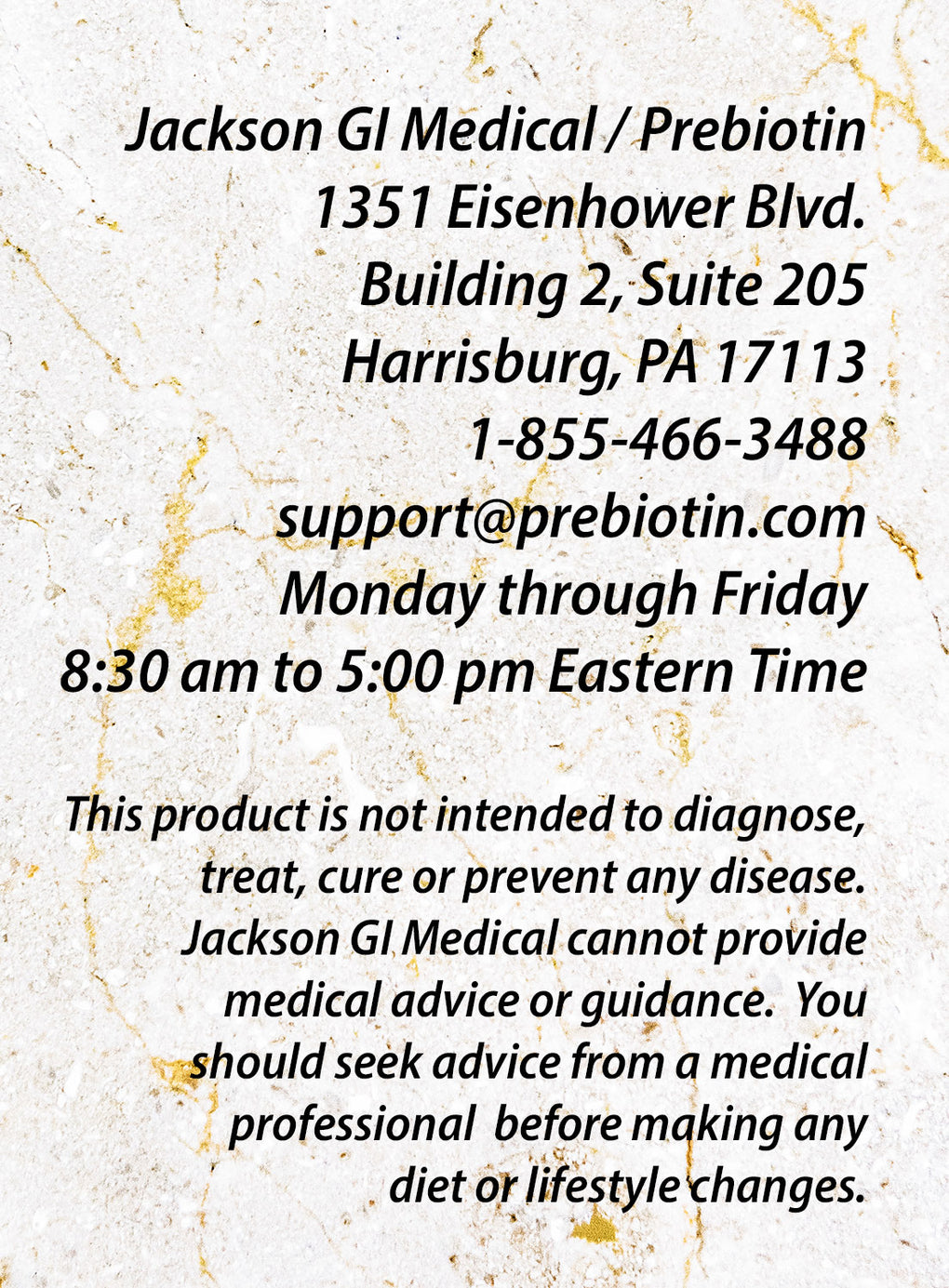
by Dr. Frank Jackson
Prebiotin Academy
Medical Concerns, Scientific Research and Diets
Hemorrhoids
The Facts
Introduction
Hemorrhoids, or piles, are one of mankind’s most common and nagging disorders. By themselves, hemorrhoids are rarely serious, but they can be extremely troublesome. In some instances, they may mask a more serious disorder, such as colon or rectal cancer. Therefore, hemorrhoids require the proper diagnosis and treatment by a physician. Hemorrhoids are dilated (enlarged) veins which occur in and around the anus and rectum. They may be external (outside the anus) or internal and slip to the outside. In both of these instances, the hemorrhoids can be felt and seen as lumps or knots. Hemorrhoids also may remain inside the rectum and so cannot be felt or seen. These are called internal hemorrhoids.
What Causes Hemorrhoids?
A common cause of hemorrhoids is simply the prolonged standing position, in which all the blood above the rectum exerts pressure on the rectal and anal areas. Other conditions which contribute to hemorrhoids are poor bowel habits, constipation, diarrhea, pregnancy, obesity, and especially frequent straining when having a bowel movement. However, some patients will have none of these conditions and still develop hemorrhoids.
What Are the Complications?
Hemorrhoids can produce several uncomfortable, but non-serious problems:
- Thrombosis and pain – a blood clot in the hemorrhoid may sometimes cause severe pain and usually demands immediate medical attention.
- Bleeding – Hemorrhoids can ooze fresh red blood, whether located externally or internally. External hemorrhoids often cause dripping of blood from the anus while sitting on the toilet. The blood might also be seen as soiling of the underwear. Internal hemorrhoids that bleed may produce fresh blood in the stool.
- Itching and irritation – External hemorrhoids can be itchy, especially if the area is moist and irritated.
Do Hemorrhoids Cause Cancer?
Hemorrhoids do not develop into cancer. However, both hemorrhoids and cancer can cause rectal bleeding. In fact, many disorders can cause rectal bleeding. When rectal bleeding occurs in persons over age 30, and especially in those over age 50, it should be considered a serious problem until an exact diagnosis is made. The physician who examines the rectal area can often make the specific diagnosis.
Conservative Treatment
Treatment of hemorrhoids varies depending on where they are, what problems they are causing, and how serious they are. Often, time and the normal process of healing clear hemorrhoids with little or no specific treatment. When hemorrhoids require treatment, the following general measures are recommended:
- Keep the anal area clean, using a mild soap and gentle dabbing after a bowel movement. Avoid vigorous rubbing of the area.
- Keep the anus and hemorrhoids as dry as possible, using powder and a pad of soft tissue to absorb moisture.
- Eat a diet high in fiber (bran) and roughage. Fiber and bran retain water in the stool, producing soft, bulky stools which are easier to pass and reduce the tendency to develop hemorrhoids. The total daily fiber intake should be 25-35 grams per day. This can usually be done by eating a wide variety of plant foods including grains, fruits, and vegetables, also known as a high fiber diet. Go to our High Fiber Diet page to learn more about the benefits of eating a diet high in fiber. Additionally, dietary supplements can be used including prebiotic fiber powders, which can provide additional colon health benefits.
- Avoid straining when having a bowel movement.
- When thrombosis, pain, and tenderness occur, a 10 to 20-minute warm tub bath 2 to 4 times daily brings heat to the area, provides relief from the pain, and promotes healing. This is called a hot Sitz bath.
Ligation
A common method of treating internal hemorrhoids is to use a small rubber band to tie off the base of the swollen vein. The blood circulation stops and the hemorrhoid then falls off. Repeat treatments are sometimes necessary.
Coagulation
There are several simple methods to coagulate internal hemorrhoids, all of which cause coagulation of the hemorrhoid which then subsequently heals.
Surgery
Surgery is sometimes recommended for treating hemorrhoids. It usually is reserved for:
- Acute, painful clot (thrombosis) of hemorrhoids
- Profusely or continuously bleeding hemorrhoids
- Longstanding, irreversible, and large hemorrhoids
- Individuals unresponsive to other treatments
The physician evaluates each patient’s case to determine the appropriate treatment.
To Prevent Hemorrhoids…
- Eat plenty of fiber, bran, or roughage. If needed, use a fiber supplement to maintain regular, soft bowel movements.
- Do not delay or try to prevent a bowel movement when the urge is present.
- Exercise, especially aerobic, may help produce more regular bowel movements.
- Drink plenty of liquids and eat regularly scheduled meals.
- Keep the area around the anus clean and dry.
Summary
Hemorrhoids are an especially common disorder and often clear up by themselves or with minimal treatment. Treatment typically is simple and effective, although surgery occasionally is necessary. Hemorrhoids can mask a more serious disorder and, therefore, must be evaluated and diagnosed properly by a physician. People with hemorrhoids who work closely with their physician are usually assured a good outcome and relief from this common disorder.
Explore More
Medical Concerns, Scientific Research and Diets
-
Antibiotics and the Microbiome
-
C. Difficile
-
Calcium and Bone Density
-
Cancer
-
Celiac Disease and Gluten Intolerance
-
Children and Prebiotics
-
Colon Gas and Flatus
-
Colon Polyps and Cancer
-
Constipation
-
Crohn’s Disease
-
Diabetes Type 2
-
Diarrhea
-
Diverticulosis
-
Dysbiosis
-
End Stage Kidney Disease/Dialysis
-
Fatty Liver/Steatohepatitis
-
Fissure, Fistula and Abscess
-
Gut-Brain Connection
-
Heart and Cardiovascular
-
Hemorrhoids
-
High Fiber Diet
-
Immunity
-
Inflammatory Bowel Disease
-
Irritable Bowel Syndrome
-
Leaky Gut Syndrome
-
Low Fat Diet
-
Low Fiber Diet
-
Obesity and Weight Management
-
Toxins in the Colon
-
Ulcerative Colitis





